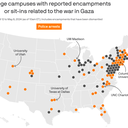Mapped: Where pro-Palestinian student protesters have been arrested

More than 2,900 people have been arrested at pro-Palestinian protests on at least 59 college campuses across the U.S. in recent weeks.
Why it matters: University administrations have cracked down on student demonstrators in unprecedented ways as protests grow in size and intensity.
- The majority of arrests have occurred at encampments and sit-ins. Dozens of smaller-scale college protests haven't seen altercations between demonstrators and police.
- More than 130 universities have had encampments or sit-ins.
The latest: Police arrested 33 protesters at George Washington University early Wednesday morning after the demonstrations had "become more volatile," Washington Metropolitan Police Department Chief Pamela Smith said at a press briefing.
- At the University of Massachusetts Amherst on Tuesday night, police arrested about 130 protesters after they refused to dismantle their encampment, a university spokesperson confirmed to Axios.
- Police arrested 64 protesters at UC San Diego on Monday while clearing the campus' pro-Palestinian encampment, the school's chancellor said in a statement.
- New York police last Friday arrested 13 protesters at New York University and 43 at The New School, an NYPD spokesperson confirmed to Axios.
- Police said 210 people were arrested at UCLA last Wednesday night into Thursday morning after officers moved on an encampment on campus.
- Close to 300 people were arrested at Columbia University and the City College of New York last week.
Catch up quick: Students set up an encampment on Columbia's campus on April 17 in response to university's president Minouche Shafik's testimony before Congress.
- She appeared more aligned with legislators who are decrying student protests than her counterparts at Harvard and Penn during previous, similar testimony.
- On April 18, Shafik called on the New York Police Department to disband the encampment. Columbia protesters have now risked suspensions and expulsion by continuing to demonstrate beyond an April 29 deadline set by the university.
- Solidarity encampments and sit-ins have popped up at colleges from coast to coast. Student protests against the war in Gaza have been taking place across the country for more than six months but escalated with last month's incidents.
State of play: Students are demanding that their universities divest from businesses that have financial ties to Israel and those that are supporting the war in Gaza.
- The Columbia University Apartheid Divest student organization has also called on the school to end policing on campus and sever ties with Israeli academic institutions.
- The University of Southern California's Divest from Death Coalition called for full amnesty for students, staff and faculty that have been disciplined for pro-Palestinian activism.
The encampments and sit-ins have been largely peaceful, with little to no conflict until the point of police intervention.
- Most arrests have been on the grounds of trespassing. Civil rights organizations like the ACLU of Georgia have denounced them as "unconstitutional crackdowns on speech and protest."
- Universities have the right to intervene "when expressive activities get out of hand and turn violent," Amy Sanders, an attorney and journalist, told the Texas Observer, "or when people begin engaging in speech that is not protected by the First Amendment."
- "I have seen nothing to suggest that is what occurred," she added, referring to arrests at the University of Texas at Austin.
What we're watching: It's unclear how other administrations will continue to handle this inflection point.
- The University of Southern California was the first major school to cancel a graduation commencement ceremony in response to protests after canceling its pro-Palestinian valedictorian's speech.
- Columbia canceled its two main commencement ceremonies, which were scheduled for May 15.
Between the lines: The tone of university administrations' responses at some schools has encouraged students' rights to protest.
- At the University of Houston, which has seen smaller scale protests, the administration "is committed to fostering a learning where free inquiry and expression are encouraged," spokesperson Kevin Quinn told Axios.
- "We will continue to enforce our policies supporting peaceful protest to ensure all members of our community can engage in dialogue and activities in a safe and respectful manner," per Temple University spokesperson Deirdre Childress Hopkins.
Go deeper: In photos: Hundreds arrested as pro-Palestinian college protests intensify
Editor's note: This story was updated with additional developments.